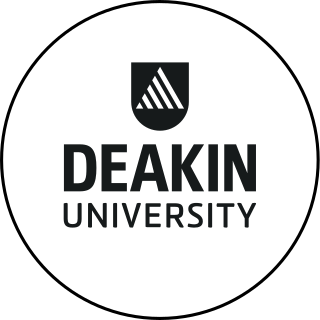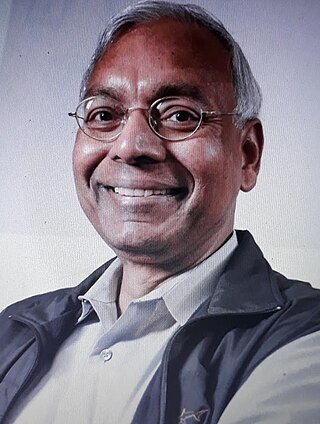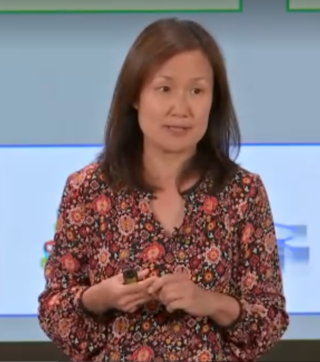
Deakin University is a public university in Victoria, Australia. Founded in 1974, the university was named after Alfred Deakin, the second Prime Minister of Australia.

Sankar Kumar Pal is a computer scientist and president of the Indian Statistical Institute, Kolkata. He is a computer scientist with an international reputation on pattern recognition, image processing, fuzzy neural network, soft computing, granular mining, and machine intelligence. He founded the Machine Intelligence Unit in 1993, and the Center for Soft Computing Research: A National Facility in 2004, both at the ISI. He is the founder president of the Indian National Academy of Engineering, Kolkata Chapter.

Deborah Louise McGuinness is an American computer scientist and researcher at Rensselaer Polytechnic Institute (RPI). She is a professor of Computer, Cognitive and Web Sciences, Industrial and Systems Engineering, and an endowed chair in the Tetherless World Constellation, a multidisciplinary research institution within RPI that focuses on the study of theories, methods and applications of the World Wide Web. Her fields of expertise include interdisciplinary data integration, artificial intelligence, specifically in knowledge representation and reasoning, description logics, the semantic web, explanation, and trust.

Rosalind Wright Picard is an American scholar and inventor who is Professor of Media Arts and Sciences at MIT, founder and director of the Affective Computing Research Group at the MIT Media Lab, and co-founder of the startups Affectiva and Empatica.

Akshay Venkatesh is an Australian mathematician and a professor at the School of Mathematics at the Institute for Advanced Study. His research interests are in the fields of counting, equidistribution problems in automorphic forms and number theory, in particular representation theory, locally symmetric spaces, ergodic theory, and algebraic topology.

Genevieve Bell is an Australian cultural anthropologist, best known for her work at the intersection of cultural practice research and technological development, and for being an industry pioneer of the user experience field. Bell was the inaugural director of the Autonomy, Agency and Assurance Innovation Institute (3Ai), which was co-founded by the Australian National University (ANU) and CSIRO’s Data61, and a Distinguished Professor of the ANU College of Engineering, Computing and Cybernetics. In 2021, she became the inaugural Director of the new ANU School of Cybernetics. She also holds the university's Florence Violet McKenzie Chair, and is the first SRI International Engelbart Distinguished Fellow. Bell is also a Senior Fellow and Vice President at Intel. She is widely published, and holds 13 patents.

Toby Walsh is Chief Scientist at UNSW.ai, the AI Institute of UNSW Sydney. He is a Laureate fellow, and professor of artificial intelligence in the UNSW School of Computer Science and Engineering at the University of New South Wales and Data61. He has served as Scientific Director of NICTA, Australia's centre of excellence for ICT research. He is noted for his work in artificial intelligence, especially in the areas of social choice, constraint programming and propositional satisfiability. He has served on the Executive Council on the Association for the Advancement of Artificial Intelligence.

Anil Kumar Jain is an Indian-American computer scientist and University Distinguished Professor in the Department of Computer Science & Engineering at Michigan State University, known for his contributions in the fields of pattern recognition, computer vision and biometric recognition. He is among the top few most highly cited researchers in computer science and has received various high honors and recognitions from institutions such as ACM, IEEE, AAAS, IAPR, SPIE, the U.S. National Academy of Engineering, the Indian National Academy of Engineering and the Chinese Academy of Sciences.

Lise Getoor is a professor in the computer science department, at the University of California, Santa Cruz, and an adjunct professor in the Computer Science Department at the University of Maryland, College Park. Her primary research interests are in machine learning and reasoning with uncertainty, applied to graphs and structured data. She also works in data integration, social network analysis and visual analytics. She has edited a book on Statistical relational learning that is a main reference in this domain. She has published many highly cited papers in academic journals and conference proceedings. She has also served as action editor for the Machine Learning Journal, JAIR associate editor, and TKDD associate editor.
Geoffrey I. Webb is Professor of Computer Science at Monash University, founder and director of Data Mining software development and consultancy company G. I. Webb and Associates, and former editor-in-chief of the journal Data Mining and Knowledge Discovery. Before joining Monash University he was on the faculty at Griffith University from 1986 to 1988 and then at Deakin University from 1988 to 2002.

Fei-Fei Li is an American computer scientist who was born in China and is known for establishing ImageNet, the dataset that enabled rapid advances in computer vision in the 2010s.

Thomas G. Dietterich is emeritus professor of computer science at Oregon State University. He is one of the pioneers of the field of machine learning. He served as executive editor of Machine Learning (journal) (1992–98) and helped co-found the Journal of Machine Learning Research. In response to the media's attention on the dangers of artificial intelligence, Dietterich has been quoted for an academic perspective to a broad range of media outlets including National Public Radio, Business Insider, Microsoft Research, CNET, and The Wall Street Journal.

Jianying Hu is a Chinese-American computer scientist at the IBM Thomas J. Watson Research Center, Yorktown Heights, NY, USA, known for her work in data mining, machine learning and health informatics. She is an IBM Fellow, Global Science Leader of AI for Healthcare and Director of Healthcare and Life Sciences Research at IBM. She is also an Adjunct Professor in the Department of Medicine at the Icahn School of Medicine at Mount Sinai. She has published over 150 scientific papers and holds more than 50 patents.
Dacheng Tao is an engineer from the University of Sydney, Australia. He received a PhD in 2007 from the University of London under Stephen Maybank, with a thesis titled Discriminative linear and multilinear subspace methods. He was named a Fellow of the Institute of Electrical and Electronics Engineers (IEEE) in 2015 for his contributions to pattern recognition and visual analytics. He was awarded an Australian Laureate Fellowship in 2017. In 2018, Tao was also elected a Fellow of the Australian Academy of Science (FAA) for his "ground-breaking contributions in artificial intelligence, computer vision image processing and machine learning. He was elected as an ACM Fellow in 2019 "for contributions to representation learning and its applications". He was selected to the Global Young Academy. Tao won the Australian Museum's Eureka Prize for Excellence in Data Science in 2020. He has written over 1200 publications across various Artificial Intelligence fields, including pattern recognition, visual analytics, and statistical learning theory.

Carla Pedro Gomes is a Portuguese-American computer scientist and professor at Cornell University. She is the founding Director of the Institute for Computational Sustainability and is noted for her pioneering work in developing computational methods to address challenges in sustainability. She has conducted research in a variety of areas of artificial intelligence and computer science, including constraint reasoning, mathematical optimization, and randomization techniques for exact search methods, algorithm selection, multi-agent systems, and game theory. Her work in computational sustainability includes ecological conservation, rural resource mapping, and pattern recognition for material science.
Tin Kam Ho is a computer scientist at IBM Research with contributions to machine learning, data mining, and classification. Ho is noted for introducing random decision forests in 1995, and for her pioneering work in ensemble learning and data complexity analysis. She is an IEEE fellow and IAPR fellow.
Jiebo Luo is a Chinese-American computer scientist, the Albert Arendt Hopeman Professor of Engineering and Professor of Computer Science at the University of Rochester. He is interested in artificial intelligence, data science and computer vision.

Cynthia Diane Rudin is an American computer scientist and statistician specializing in machine learning and known for her work in interpretable machine learning. She is the director of the Interpretable Machine Learning Lab at Duke University, where she is a professor of computer science, electrical and computer engineering, statistical science, and biostatistics and bioinformatics. In 2022, she won the Squirrel AI Award for Artificial Intelligence for the Benefit of Humanity from the Association for the Advancement of Artificial Intelligence (AAAI) for her work on the importance of transparency for AI systems in high-risk domains.
Olga Russakovsky is an assistant professor of computer science at Princeton University. Her research investigates computer vision and machine learning. She was one of the leaders of the ImageNet Large Scale Visual Recognition challenge and has been recognised by MIT Technology Review as one of the world's top young innovators.













